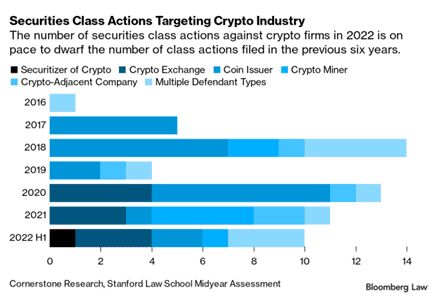- with readers working within the Pharmaceuticals & BioTech industries
- within Corporate/Commercial Law topic(s)
Since the start of the century, the finance industry has been drifting away from traditional banking, trading, and asset management methods and towards a more digital economy. This gave rise to an entirely new, unchecked segment of the market that is now booming with both legal conflict and impending regulation. Artificial intelligence (AI), blockchain, cloud computing, and big data are considered to be the four key areas in fintech, and these concepts support other finance innovations currently dominating headlines like cryptocurrencies, central bank digital currencies (CBDCs), and decentralized finance (DEFI). As these innovations in digital assets continue to expand, the market is now looking to regulatory bodies to control what has evolved beyond business opportunity into a burgeoning area for fraud and financial misconduct.
Earlier this year, The White House attempted to tame the wild west of finance by enacting an executive order on ensuring the responsible development of digital assets. In the time since, the government has worked to develop frameworks that support the six key areas outlined in the EO. So, what does this regulation look like? And how are entities like the DOJ and SEC ensuring that fintech players are playing fair?
A Push for Crypto Regulators to Move Faster
According to the White House, almost half of the world's 100 most valuable fintechs hail from the United States. And in a widely unchecked industry, this leaves room for a plethora of illicit activity.
The new policy recommendations from the government start by focusing on the protection of consumers, investors, and businesses. Digital assets are typically high risk, and their value is unstable- the current crypto global market capitalization is approximately one-third of its November 2021 peak. This summer, we saw just how volatile the crypto market could be as coins crashed and non-compliance ran rampant. The Wall Street Journal reported that "almost a quarter of digital coin offerings had disclosure or transparency problems-like plagiarized documents or false promises of guaranteed returns." Further, the FBI reported that monetary losses from scams exploded by almost 600% from 2020 to 2021.
To combat this, the White House announced that they were "issuing guidance, increasing enforcement resources, and aggressively pursuing fraudulent actors." These actions involve pushing regulators like the Securities and Exchange Commission (SEC) and Commodity Futures Trading Commission (CFTC), as well as entities like the Consumer Financial Protection Bureau (CFPB) and Federal Trade Commission (FTC), to pursue investigations and complaints that indicate unlawful activity in the digital asset space. Further, the Financial Literacy Education Commission (FLEC) will lead efforts to educate consumers on the risks of digital assets and what to look out for when it comes to misconduct.
Additional highlights from the fact sheet include the focus on promoting access to safe, affordable financial services; fostering financial stability; advancing responsible innovation; fighting illicit finance; and exploring a U.S. Central Bank Digital Currency (CBDC).
While the regulatory action outlined in the fact sheet provided great insight into the plans for standards in the space by the federal government, that doesn't mean that the aforementioned entities are actually acting- yet. In fact, many government officials have been calling on these regulatory bodies to move faster as more conflicts around digital assets like cryptocurrencies creep into court.
The DOJ's Crypto Crackdown
While President Biden and his team have been working hard to set up these frameworks, the Department of Justice (DOJ) has been working even harder to prosecute those acting illicitly. They have been cracking down on recent illegal activity in the space, and even announced the creation of the Digital Asset Coordinator Network (DAC) this past month, which is aimed at combatting "the growing threat posed by the illicit use of digital assets to the American public." This was prompted by President Biden's crypto executive order and will be led by the Justice Department's Cryptocurrency Enforcement Team consisting of more than 150 federal prosecutors looking to act against crypto criminals. But the DOJ, SEC, and more are already moving the wheels on curbing corruption in the industry.
Looking to Litigation
While these regulatory actions look to limit litigation in the fintech space as innovation in the market expands, there has already been a slew of cases involving digital currencies that have taken the legal world by storm. The SEC and DOJ have been bringing crypto fraud enforcement to headlines, charging former Coinbase employees with insider trading schemes and prosecuting celebrities like Kim Kardashian for federal securities violations. These actions come after the DOJ's first-ever charge for an insider trading scheme involving NFTs on Opensea, and a slew of probes into companies like Binance to provide records about the cryptocurrency exchange platform's anti-money laundering checks. Additionally, on the horizon are more revelations involving Forex platforms conducting Ponzi schemes to bilk targeted investors of their assets-take SEC v. Mauricio Chavez, et al, as a recent example.
As regulatory action ramps up and the SEC and DOJ alike make things like insider trading and illicit asset management their priority, businesses should be taking note of these conflicts and begin evaluating their processes for inconsistencies. Those in the space must consider the risks involved with digital currency and prepare themselves for a more tightly regulated fintech future before it's too late. Lawyers have already filed 58 securities class action lawsuits against crypto companies, with more than a third coming since 2020.

Engaging with experts early in the litigation process can help firms uncover questionable or potentially illegal practices happening under their noses. And with the legal need in the digital assets market expanding fast, a highly-credentialed expert witness can help address issues that enable firms to extricate themselves before they get indicted in a conspiracy.
Originally published October 19, 2022
The content of this article is intended to provide a general guide to the subject matter. Specialist advice should be sought about your specific circumstances.


